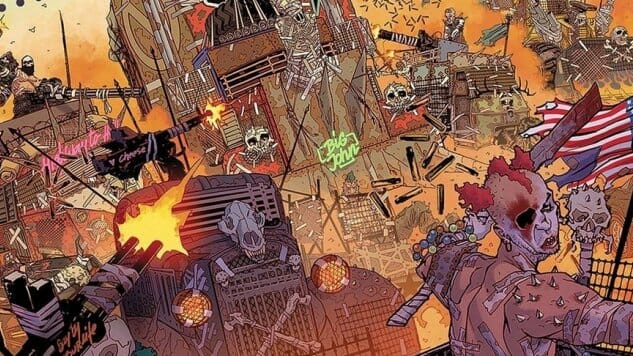Prepare for the Apocalypse with the Great Board Game Wasteland Express Delivery Service
Games Reviews board games
Combining elements of Fallout, Galaxy Trucker and Pimp My Ride, Wasteland Express Delivery Service made my top 10 games of 2017 list and was the top complex game I ranked, with only Great Western Trail (a late 2016 release) topping it among heavier games I played last year. If you’ve ever dreamed of tricking out a post-apocalyptic truck to deliver supplies across a landscape scarred by nuclear war and still glowing with radiation, well, my friends, this is the game for you.
Wasteland Express has a semi-variable board of terrain tiles and outposts, and each game starts with three public contracts players will try to fulfill, with the first player to finish three separate contracts winning the game immediately. In the meantime, players can make smaller deliveries between outposts, some of which supply weapons, food or water, while others will pay for those deliveries, earning money for their trouble. The funds can then be used at certain outposts to upgrade the players’ trucks, adding more weapons or special abilities like faster movement, greater storage, or the power to pass through irradiated areas of the board without taking damage.
In each round, players get to take actions as long as they have any of their five action markers available. The most common action is movement, and stacking movement actions allows you to move further each turn—three spaces the first action, then four, and then five, losing this “momentum” only when you take an action other than movement such as buying or delivering goods or fighting a raider truck. Route-planning is a core part of the game, as you will often want to take longer paths to avoid raiders or irradiated areas, or will try to set yourself up for subsequent visits to outposts where you can spend your profits to boost your truck. (Each player also has a “not wanted” token, used to mark the last outpost to which the player delivered goods, so you can’t deliver to the same outpost twice in a row.)
Players in Wasteland Express don’t attack each other directly, however, but can encounter any of three raider trucks on the board and then must fight them or flee and take damage. These trucks become fairly easy to beat later in the game as the players’ trucks get stronger, and the downside of a failed battle is relatively small, so fighting them isn’t the worst idea and can often leave you with a couple of extra goods for your trouble. Since you can only carry goods for which you have enough storage, though, these encounters become more valuable once you’ve tricked out your truck by adding trailers and more storage units while also upgrading your weapons.

While players can all complete the public contracts, each player also draws cards from a second deck of faction cards that includes private contracts, some of which can count toward the game-end condition of completing three “priority” contracts, while others just give the player specific rewards for finishing them. Players can also add Allies from another deck, hiring them for cash and gaining extra abilities like reducing the cost of truck modifications, rerolling dice in battle or when moving through irradiated areas, or gaining extra movement points.
The beauty of Wasteland Express is that the huge number of components and game options doesn’t really add complexity to the rules, just to the number of ways you can approach the game. This is a pickup and delivery game with some route-planning elements, and quite simple at its heart; you just get to go after the problem from lots of angles so that each game can feel quite different. Some elements are necessary—you’re gonna need a bigger truck—but some are optional; you can be aggressive, load up on weapons, and go after raiders, or you can avoid them almost entirely and focus on higher-value deliveries. There are contracts that introduce special items or rules, including the Questionable Decisions card, where you can transport nuclear weapons; or the Big Dig, where you buy a pricey Digger mod, go to sites with face-down treasure tokens on them, and use an action for the 1/3 chance that you’ll uncover a treasure. There are four raider outposts you can also raid, and there’s a contract that pays out if you pillage all four. It’s also a game tailor-made for expansions in the form of new faction cards (contracts), allies and maybe even more mods.
Games take about two hours, mostly because players have to sift through so many options for each action, although wait times aren’t that long because players use one action at a time, rather than each player exhausting all of his/her actions before the next player can go. I’ve found that the best part is figuring out how best to outfit the truck—sure, delivering stuff is fine, but buying new mods is better—which, along with the variable board, helps boost the replay value as well. Don’t let the lengthy rulebook or the time required to punch out all of the cardboard pieces (seriously, that took me more than 45 minutes) scare you off, though. Wasteland Express Delivery Service is a lot more accessible than it looks.
Keith Law is a senior baseball writer for ESPN.com and an analyst on ESPN’s Baseball Tonight. You can read his baseball content at search.espn.go.com/keith-law and his personal blog the dish, covering games, literature, and more, at meadowparty.com/blog.